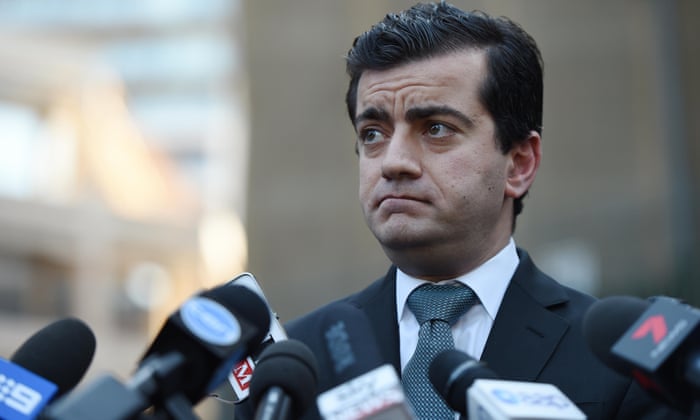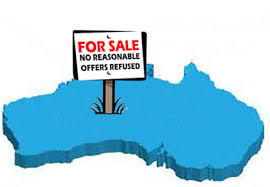- Sam Dastyari contradicted South China Sea policy a day after Chinese donor's threat
- Billionaire Huang Xiangmo took exception to Labor’s stance on disputed territory and threatened to withdraw a $400,000 donation.
By Gabrielle Chan


According to Four Corners, from 1 July 2016 Robb was paid $73,000 a month, or $880,000 a year, plus expenses.

Australia's Quisling: Labor senator Sam Dastyari told the Chinese media in September 2016 that Australia shouldn’t interfere with China’s activities in the South China Sea, contradicting his own party’s policy.
The Labor senator Sam Dastyari contradicted Labor party policy on the South China Sea a day after influential Chinese billionaire Huang Xiangmo threatened to withdraw a promised $400,000 donation to the party, Four Corners has alleged.
The program, by Faifax’s Nick McKenzie, reports that Huang took exception to comments made by then Labor defence shadow Stephen Conroy that Australia’s defence force should be able to conduct freedom of navigation operations in the disputed area.
After Huang threatened to cancel the donation, Dastyari told the Chinese media that Australia shouldn’t interfere with China’s activities in the South China Sea.
The program, by Faifax’s Nick McKenzie, reports that Huang took exception to comments made by then Labor defence shadow Stephen Conroy that Australia’s defence force should be able to conduct freedom of navigation operations in the disputed area.
After Huang threatened to cancel the donation, Dastyari told the Chinese media that Australia shouldn’t interfere with China’s activities in the South China Sea.
When the comments were reported, Dastyari denied he had split with the party on the policy, saying he wasn’t responsible for the way it was reported.
Four Corners also reported that Dastyari’s office asked the immigration department of the progress of Huang’s stalled citizenship application four times in the lead-up to the last election with the senator personally making two of the calls.
Huang is chairman of the Yuhu Group and had previously donated $5,000 to cover “legal bills” before Dastyari was a senator as well as larger amounts to both sides of politics and a number of universities as well as charities.
In a statement to Four Corners, Huang said he took “strong objection” to any suggestion he had linked his donations to any foreign policy outcome.
The report comes less than a year after Dastyari resigned from the Labor shadow ministry after it was revealed that he asked for and accepted a payment of $1,670.82 from Australian Chinese businessman Minshen Zhu.
At the time Dastyari said he had “fallen short” in his duty as a member of parliament but he was reinstated to the shadow minister in February this year as Senate deputy opposition whip.
The government is currently considering a report in March this year by the Joint Parliamentary Standing Committee on Electoral Matters which recommended a ban on foreign donations but split on donations from activist groups.
The government has yet to formulate a response to the report but it is understood it is very close. Malcolm Turnbull has previously said he favours a ban on foreign donations and it is also Labor party policy.
Huang gave $770,000 to the Liberals before the 2013 election and donated $100,000 to the then trade minister Andrew Robb’s campaign fundraising vehicle, as Robb signed off on the China Australia Free Trade deal.
Robb developed a close relationship with the billionaire and was quoted in a speech on Four Corners as a “thoughtful cerebral fellow” and a “visionary”.
Another Chinese based company, Landbridge, controversially won the 99-year lease on the port of Darwin in 2015 when Robb was still trade minister.
Four Corners revealed that Robb had been appointed as a consultant to Landbridge on 1 July, the day before he retired from politics.
Four Corners also reported that Dastyari’s office asked the immigration department of the progress of Huang’s stalled citizenship application four times in the lead-up to the last election with the senator personally making two of the calls.
Huang is chairman of the Yuhu Group and had previously donated $5,000 to cover “legal bills” before Dastyari was a senator as well as larger amounts to both sides of politics and a number of universities as well as charities.
In a statement to Four Corners, Huang said he took “strong objection” to any suggestion he had linked his donations to any foreign policy outcome.
The report comes less than a year after Dastyari resigned from the Labor shadow ministry after it was revealed that he asked for and accepted a payment of $1,670.82 from Australian Chinese businessman Minshen Zhu.
At the time Dastyari said he had “fallen short” in his duty as a member of parliament but he was reinstated to the shadow minister in February this year as Senate deputy opposition whip.
The government is currently considering a report in March this year by the Joint Parliamentary Standing Committee on Electoral Matters which recommended a ban on foreign donations but split on donations from activist groups.
The government has yet to formulate a response to the report but it is understood it is very close. Malcolm Turnbull has previously said he favours a ban on foreign donations and it is also Labor party policy.
Huang gave $770,000 to the Liberals before the 2013 election and donated $100,000 to the then trade minister Andrew Robb’s campaign fundraising vehicle, as Robb signed off on the China Australia Free Trade deal.
Robb developed a close relationship with the billionaire and was quoted in a speech on Four Corners as a “thoughtful cerebral fellow” and a “visionary”.
Another Chinese based company, Landbridge, controversially won the 99-year lease on the port of Darwin in 2015 when Robb was still trade minister.
Four Corners revealed that Robb had been appointed as a consultant to Landbridge on 1 July, the day before he retired from politics.

According to Four Corners, from 1 July 2016 Robb was paid $73,000 a month, or $880,000 a year, plus expenses.
He told Four Corners he acted in line with his obligations as former trade minister.
The statement of ministerial standards states ministers should not lobby or advocate with the government for 18 months after their political retirement.
Prof John Fitzgerald of the Ford Foundation, Beijing, told the program “Mr Huang is very generous to all parties”.
“He could hardly be called partisan; he contributes to the Liberal party as well as to the Labor party,” Fitzgerald says.
The statement of ministerial standards states ministers should not lobby or advocate with the government for 18 months after their political retirement.
Prof John Fitzgerald of the Ford Foundation, Beijing, told the program “Mr Huang is very generous to all parties”.
“He could hardly be called partisan; he contributes to the Liberal party as well as to the Labor party,” Fitzgerald says.
“He’s also a very generous employer of former party operatives.”
Huang has also employed former New South Wales Labor treasurer Eric Roozendaal.
The program also investigated the donations of an Australian Chinese citizen Chau Chak Wing who was a member of a Communist party advisory group known as a people’s political consultative conference (CPPCC).
The group carries out the work of a party lobbying arm called the United Front Work Department.
Chau has donated more than $4m to the major parties over the past decade, according to Four Corners.
Four Corners revealed that the Asio chief, Duncan Lewis, has become so worried about the influence of foreign donations that he organised meetings with the senior party officers from the federal Liberal, National parties and Labor parties to warn them that the donors could compromise the major parties.
The executive director of the Australian Strategic Policy Institute, Peter Jennings, described such donations as naked influence buying.
“I think that this type of, frankly, naked influence buying, is something which is damaging to Australia’s political system.
“I would far rather have a regime in place whereby we, the taxpayer, pay for the cost of our elections than relying on parties to get donations from foreign sources, wherever they may come from.
“But you know, notably those foreign sources are primarily linked to Chinese business.”
Huang has also employed former New South Wales Labor treasurer Eric Roozendaal.
The program also investigated the donations of an Australian Chinese citizen Chau Chak Wing who was a member of a Communist party advisory group known as a people’s political consultative conference (CPPCC).
The group carries out the work of a party lobbying arm called the United Front Work Department.
Chau has donated more than $4m to the major parties over the past decade, according to Four Corners.
Four Corners revealed that the Asio chief, Duncan Lewis, has become so worried about the influence of foreign donations that he organised meetings with the senior party officers from the federal Liberal, National parties and Labor parties to warn them that the donors could compromise the major parties.
The executive director of the Australian Strategic Policy Institute, Peter Jennings, described such donations as naked influence buying.
“I think that this type of, frankly, naked influence buying, is something which is damaging to Australia’s political system.
“I would far rather have a regime in place whereby we, the taxpayer, pay for the cost of our elections than relying on parties to get donations from foreign sources, wherever they may come from.
“But you know, notably those foreign sources are primarily linked to Chinese business.”
